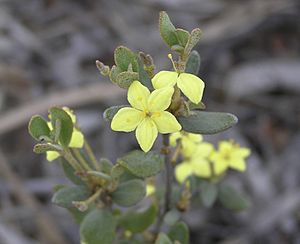Yellow starbush facts for kids
Quick facts for kids Yellow starbush |
|
|---|---|
 |
|
| Scientific classification | |
| Genus: |
Asterolasia
|
| Species: |
squamuligera
|
| Synonyms | |
|
|
The Yellow Starbush (scientific name: Asterolasia squamuligera) is a type of plant. It is a tall, woody shrub that lives for many years. This plant is special because it only grows in the southwest part of Western Australia.
It has tough, egg-shaped leaves. Its yellow flowers grow in clusters of five to ten. Each flower has a special fringe of scales on the back of its petals. It also has about ten stamens, which are the parts that hold pollen.
Contents
Discover the Yellow Starbush's Appearance
The Yellow Starbush is a thin, woody shrub. It can grow to be about 50 centimeters (20 inches) tall. Its leaves are strong and feel like leather. They are shaped like an egg, but narrower at the bottom. Each leaf is about 10 to 20 millimeters long. They are usually smooth, or have only a few tiny star-shaped hairs.
How Yellow Starbush Flowers Grow
The flowers grow in groups of five to ten. These groups are called umbels. They appear where leaves meet the stem, or at the ends of branches. Each flower sits on a thin stalk, up to 15 millimeters long. The petals are yellow and shaped like an oval. They are about 6 millimeters long. A cool thing about them is the fringe of scales on their back. Each flower also has about ten stamens. Stamens are the parts of the flower that make pollen.
Uncovering the Yellow Starbush's Name
This plant was first officially described in 1848. A scientist named William Jackson Hooker gave it the name Phebalium squamuligerum. He wrote about it in a book called Icones Plantarum. The plants he studied were collected by James Drummond.
Later, in 1863, another scientist, George Bentham, changed its name. He renamed it Asterolasia squamuligera. This new name was published in his book, Flora Australiensis.
Where the Yellow Starbush Lives
The Yellow Starbush grows in special soil called laterite. This soil is often found on hilltops and flat areas. You can find this plant in Western Australia. It grows from near Augusta all the way east to Lake Grace. It also grows from Beverley south to Mount Barker.
How We Protect the Yellow Starbush
The Government of Western Australia's Department of Parks and Wildlife has looked at the Yellow Starbush. They have decided that it is "not threatened." This means the plant is not currently in danger of disappearing.

